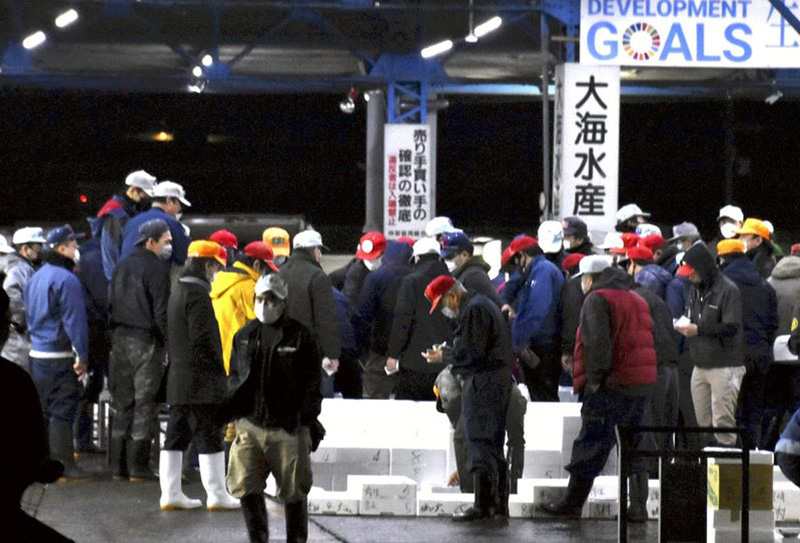Clam shipments from Japan’s major production area suspended amid false labeling of foreign products

Bidding is held at a regional wholesale market in Kumamoto Prefecture in the early morning on Tuesday.
10:48 JST, February 14, 2022
Shipments of asari clams produced in Kumamoto Prefecture were suspended from Feb. 8, in the wake of revelations that a large quantity of littleneck clams from China and South Korea had been falsely labeled as products of the prefecture.
The suspension aims to eliminate falsely labeled asari clams, also known as Japanese littleneck clams. Shipments of such clams from the prefecture, one of the nation’s largest producers, will be suspended for about two months.
However, consumer trust in the clams may have been so badly shaken that it is uncertain whether it can be recovered.
Wholesale markets hit pause
qTsukiji Uoichiba Co., a wholesaler at the Toyosu wholesale market, the centerpiece of Tokyo’s food supply system, did not trade in asari clams labeled as coming from Kumamoto Prefecture on the day the suspension began.
The company previously traded asari clams from the prefecture at ¥500 to ¥600 per kilogram.
But on the day, the company bought 300 kilograms of asari clams from China at ¥400 per kilogram and 100 kilograms of clams from Hokkaido at ¥1,700 per kilogram. Prices of Hokkaido asari clams surged on the day.
A company official in charge of trading said, “We can’t buy products that are suspect.”
At the Fukuoka City Central Wholesale Market, it was found that asari clams were supplied from China instead of Kumamoto Prefecture, and the total amount was halved in the wake of the revelation.
At the Osaka Municipal Central Wholesale Market, asari clams from the prefecture were not traded, and the total amount traded fell to one-tenth of usual levels. Only asari clams from Hokkaido and China were traded on Feb. 8.
Though Kumamoto Prefecture has been one of the nation’s largest producers of the clams, its production volume in 2020 fell to 21 tons.
However, research by the Agriculture, Forestry and Fisheries Ministry showed that an estimated 2,485 tons of asari clams were sold as having been produced in the prefecture from October to December last year.
The Kumamoto prefectural government assumes that many of the products were produced overseas and then falsely labeled.
Tracing system
Takami Fujimori, head of the Kumamoto Prefectural Federation of Fisheries Cooperatives, who decided on the suspension after a request from the prefectural government, said: “Although it was illicit businesses that falsified the products, fishermen who did nothing wrong have been hurt. The suspension is critical, but we want to work toward eliminating false origin labeling even if it takes three or four months.”
Under the central government’s guidelines based on the Food Labeling Law, asari clams can be labeled as domestically produced even if they are originally from other countries, on the condition that they have been cultivated in Japan for a longer portion of their lifespan.
However, according to the Kumamoto prefectural government, it is very possible that a large quantity of imported asari clams that had not been cultivated domestically have been circulated through Japanese markets.
This has prompted the prefectural government’s two-month suspension.
During this period, the government is asking for information via a special emergency telephone line if asari clams labeled as being from the prefecture are traded at markets.
The prefectural government hopes to learn details of the scheme through this method.
In addition, it has asked the central government to establish a traceability system in which the history from catch to sale will be recorded.
Top Articles in Society
-

Man Infected with Measles Reportedly Dined at Restaurant in Tokyo Station
-

Man Infected with Measles May Have Come in Contact with Many People in Tokyo, Went to Store, Restaurant Around When Symptoms Emerged
-

Woman with Measles Visited Hospital in Tokyo Multiple Times Before Being Diagnosed with Disease
-

Australian Woman Dies After Mishap on Ski Lift in Nagano Prefecture
-

Foreign Snowboarder in Serious Condition After Hanging in Midair from Chairlift in Nagano Prefecture
JN ACCESS RANKING
-

Japan PM Takaichi’s Cabinet Resigns en Masse
-

Japan Institute to Use Domestic Commercial Optical Lattice Clock to Set Japan Standard Time
-

Israeli Ambassador to Japan Speaks about Japan’s Role in the Reconstruction of Gaza
-

Man Infected with Measles Reportedly Dined at Restaurant in Tokyo Station
-

Videos Plagiarized, Reposted with False Subtitles Claiming ‘Ryukyu Belongs to China’; Anti-China False Information Also Posted in Japan























